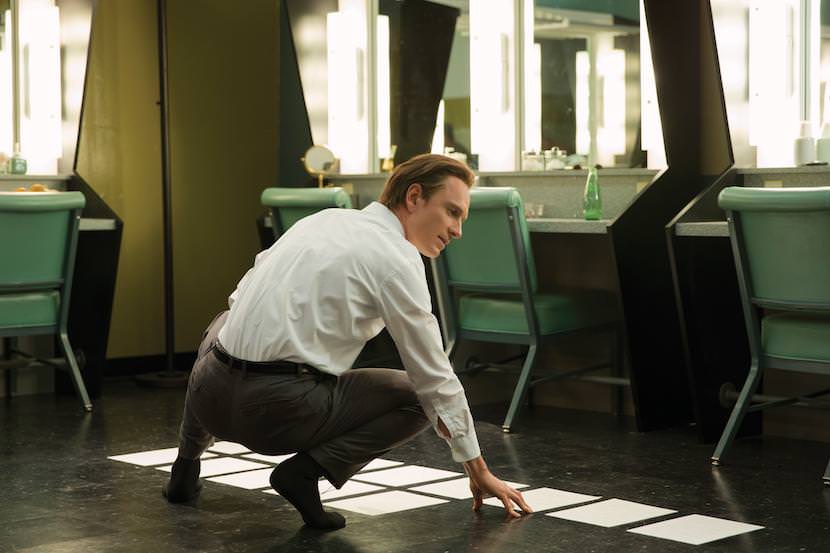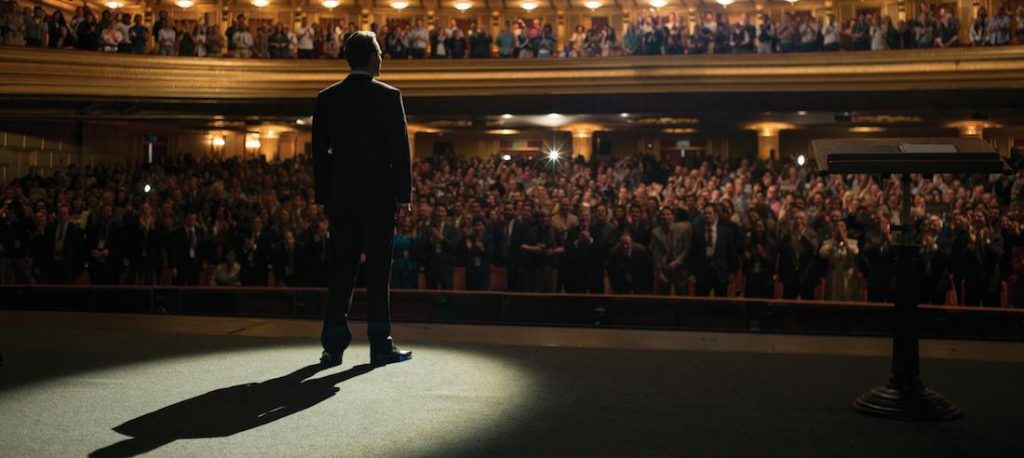How Composer Daniel Pemberton Created 3 Scores for Steve Jobs
We spoke to Steve Jobs composer Daniel Pemberton, whose previous work includes Guy Ritchie’s The Man From U.N.C.L.E, about the joys of working with a director, Danny Boyle, who’s prepared to take risks, and the challenge of complementing screenwriter Aaron Sorkin’s fast-paced dialogue.
What were your original impressions of the script when you were approached about the scoring?
The first thing that happened was I had a meeting with Danny- which got moved around a lot because of the hoo-ha that was going on behind the scenes. We chatted for about half an hour and at the end of it he was like, ‘Right, pretty much you've got the job’. I remember after I looked at the script, I was blown away. I thought the script was absolutely phenomenal. I also thought, 'This is a 185 page script and I have no idea where I'm going to do anything musically because it's just wall to wall dialogue.'
There's not a lot of space for you to play around?
Yeah, originally I kind of thought, Well, I'm not going to have to do much for this film. I'll just have to do a couple of noises, and that'll be it. That changed very quickly. When I met with Danny, he talked about the three acts and he had this great way of describing them. He called the first act ‘Vision’, the second act ‘Revenge’, and the third act ‘Wisdom’. We had this idea of trying to score the movie in three different ways and that's what we did in the end, which I'm kind of amazed we managed to actually pull off.
From the second act, 'Revenge'
From the third act, 'Wisdom;
What were the stumbling blocks for you? Watching the movie, you did pull it off, so how did you go from not thinking you could pull it off to creating such a fitting and interesting score?
Looking at it now, it seems like all a very obvious idea but at the time it was a really big gamble. That second act he described as this sort of theatrical Shakespearean tragedy. We talked about maybe making it this huge orchestral piece, like in an opera. That was quite a crazy, bold idea for this type of movie. I like kind of crazy ideas. What's great about working with Danny is he always wants to see how far he can push it musically, and he's a very exciting director to work with because he's so good at understanding what music can bring to a film.
We kind of had this idea that the first act, set in 1984, should embrace this optimism of the future. At that time there's this amazing excitement about how technology can change our lives and the potential of computing. I wanted to sort of tap into that moment in that era, which, from a technology point of view, was still quite primitive. But it felt futuristic. I wanted to use the synthesizer because I felt that was an instrument worthy of the era, and again, it was this very new exciting sound. It promised the future, but now actually sounds almost retro.
Did you have to go and try to go source various pieces of equipment from that era?
Yeah, I started off only using equipment that was available in 1984. I ended up buying a bunch of classic, old synthesizers. I wrote the music, pretty much as if I was someone in 1984. That meant I had to approach how I wrote differently. Which was kind of fascinating because now in 2015, as a modern composer using technology, you kind of can do anything you want. Where as then, we were very much limited by all kind of things.
I'm assuming that you got a greater appreciation for what Steve Jobs was doing by the end of it?
Yeah, I think one of the great things about Steve Jobs is that he stood for the belief that the computer could be a tool for artistic expression. Computers beforehand were very much seen as quite boring, academic tools. I think, what Apple understood was that computers could allow the artistic side to be explored at a level that had never been done before. I think that's one of the greatest gifts they've given the world. Allowing people to be far more creative. For me, I'm someone who has grown up through that era- I was 6 when Macintosh was launched- I'm kind of like a child of that program.
Then how did the sound differ in the second act?
The second act was very grand, orchestral score. That [Opera House] setting is really dramatic. It's very theatrical and ornate. I think orchestral music really helped reinforce those ideas. It also reinforces the idea of Steve the conductor. He's the showman, the kind of ring master of the circus that is his products.


And the third?
The third act was embracing the digital world. The same way we shot on digital, I wanted to score it digitally. Trying to do as much as I could inside the computer. I write everything on Apple, use Apple software. I wanted to embrace that tool, which I can now use to write film scores.
It works as a parallel for everything that is happening in the culmination of the film?
Yeah, I used all kinds of neat ideas. But at the end of the day, they don't really help the story or the emotional themes on their own.
Did you ever worry about that? Getting hooked on an idea because it seems like such a great device but then it's not actually working and you have to take a step back?
Yeah, all the time. We found some of the stuff I wrote early on was far too dramatic and it takes too much away from the performances. The other thing about this film is that you’ve got to create a great score that does so much, yet it's so subtle at the same time. That's actually almost harder than big dramatic orchestral pieces because we’ve got to make sure there's enough space for dialogue and the performances to breathe. At the same time, you’ve got to create a score that's got an identity and a sense of purpose and isn't just noise bubbling away in the background. Doing stuff that is really reinforcing the storytelling.
Sorkin’s dialogue also has a very recognizable rhythm to it?
It is very fast paced. I call it the libretto of the score. He's writing libretto in the words and I'm writing the music underneath. Playing off that with him, sometimes just pulling it back, sometimes speeding it up. He's fascinating to work with. It's not as straight forward to do as you think. It can be quite a challenge.
You try to approach each project differently and create a unique sound for each one, rather than put your stamp on it. Do you have a process to achieve that?
I basically start with not knowing what the hell I'm doing. I like to come on a project really early so I can basically make mistakes, experiment and fail. I might have an idea, I might not. It means I’ve got time to play and work alongside the filmmakers and try to fulfill that idea. I think if you come on at the end of a film, you don't have time or space to do that. You just have to do film music by the yard. Whereas, if you come in at the beginning, you can really experiment and try and see what could you differently. You always want it to be a surprise, to be the unexpected.
Featured image: Michael Fassbender in Steve Jobs. Photo Credit: François Duhamel. Courtesy Universal Pictures.




